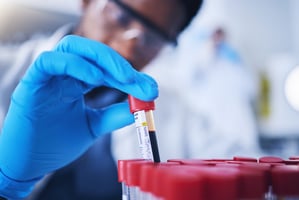A new biomarker may be on the horizon to more accurately identify psychiatric patients who may...
Blood Biomarkers May Help Identify Trauma Patients at Risk of Chronic PTSD
 |
“The findings suggest that assessing immunological changes in response to trauma exposure in the emergency department may help identify patients who are most at risk for developing chronic PTSD symptoms in the aftermath of trauma,” wrote Vasiliki Michopoulos, Ph.D., of Emory University School of Medicine and colleagues. “Such individuals may benefit from immediate psychological and pharmacological interventions that have been shown to be effective in attenuating PTSD development.”
The study included 505 adults (aged 18 to 65) who were admitted to the emergency department at Atlanta’s Grady Memorial Hospital after experiencing a trauma. All the study patients received a baseline psychological exam and had blood drawn within a few hours of the traumatic incident; they then returned for follow-up assessments of PTSD symptoms one, three, six, and 12 months later.
A total of 273 patients completed at least one follow-up visit and were included in the final analysis. Each patient was assigned to one of three groups, based on their PTSD symptoms at baseline and follow-up visits: those with chronic PTSD (n=28), those who developed PTSD but recovered (n=85), and those who did not develop PTSD (n=160).
The researchers analyzed 27 different inflammatory and anti-inflammatory molecules from the patient blood samples obtained shortly after trauma and found that the patients with chronic PTSD had significantly lower blood levels of TNFα and IFNγ—both of which contribute to inflammation—compared with patients in the other two groups. Some previous research had suggested that anti-inflammatory molecules might promote PTSD resilience, but the investigators did not find any differences in anti-inflammatory biomarkers across the three groups. However, the authors noted that because they analyzed blood taken just hours after a trauma, there may be other molecules involved in PTSD risk or resilience at other time points.
To read more about trauma-related biomarkers, see the Psychiatric News story “FDA Clears the Way for First Blood Test to Evaluate Head Injuries.”
(Image: angellodeco/Shutterstock)






